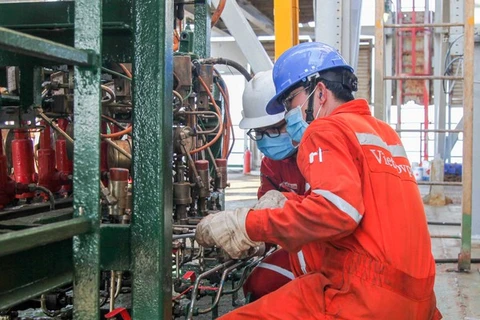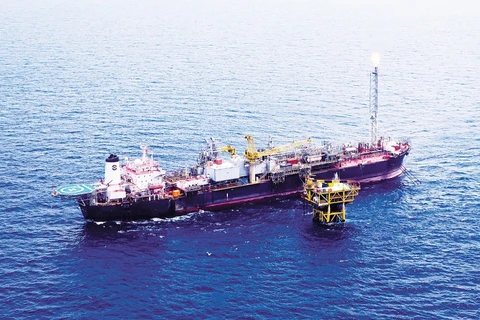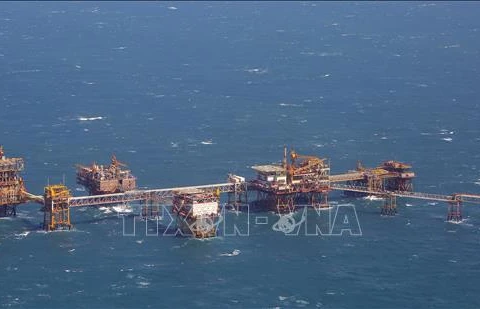Hanoi (VNS/VNA) - Despite negative effects of the COVID-19 pandemic, oil and gas enterprises still recorded a prosperous year thanks to the sharp rise in oil prices.
As oil prices are expected to remain high in the short term, enterprises in the industry are believed to continue benefitting.
Big returns
Vietnam Oil and Gas Group (PetroVietnam) said that its total profit before tax in 2021 will reach 45 trillion VND (nearly 2 billion USD), exceeding the yearly plan by 2.6 times and increasing 2.2 times compared to 2020.
The state budget payment for the whole year was completed three months ahead of schedule, with a value of 112.5 trillion VND in 2021, exceeding 80 percent of the whole year’s plan and up 36 percent compared to 2020.
PV OIL (OIL), a member of PetroVietnam, estimated its consolidated revenue reached 55 trillion VND, up 8.8 percent compared to the same period in 2020. The company’s consolidated profit before tax is estimated at 884 billion VND, exceeding 121 percent of the whole year plan.
Meanwhile, PV GAS (GAS), another member of PetroVietnam and a key player in the gas industry, said that its revenue is expected to be nearly 80 trillion VND in 2021, with estimated profit after tax of 8.38 trillion VND.
In 2021, despite the complex development of the COVID-19 pandemic, Brent price has continuously set new highs and reached a seven-year high in early October 2021, contributing to positive business results of many oil and gas enterprises.
The surge in oil prices was driven by the recovery of global fuel demand, supply disruptions due to Hurricane Ida in the US and logistics bottlenecks due to the pandemic.
Oversupply not likely
Analysts from SSI Securities Corporation (SSI) said that oil prices were always sensitive to news of new COVID-19 variants, so there would be still risks in the oil market. However, the recovery in fuel demand, especially in the aviation industry, and geopolitical uncertainty in Ukraine-Russia, which had sparked concerns over tightened supply, were supporting oil prices.
In addition, according to the Organization of the Petroleum Exporting Countries (OPEC), the total number of oil and gas rigs in 2021 exceeded 2020 but is much lower than in 2019. As investment activities have shifted to green fuel, investment in fossil fuels has declined in recent years.
Therefore, oversupply may not occur in the short term, which will continue to support oil prices.
SSI's basic scenario is that the average Brent crude price reaches 70 USD per barrel, unchanged from the same period last year. For the Vietnamese oil and gas industry, oil prices of above 60-65 USD a barrel will boost exploration and production (E&P) activities in the long term.
In 2022, SSI estimates the oil and gas industry’s profit growth to reach 20.6 percent, but still lower than the pre-COVID-19 levels. The main growth drivers for the industry are PV Drilling (PVD), Petrolimex Petrochemical Corporation (PLC), Petrolimex (PLX) and PV GAS (GAS).
Wall Street banks also forecast higher oil prices in the short and medium term, such as Goldman Sachs sees Brent price reaching 90 USD per barrel by the end of this year, up from the previous forecast, which was 80 USD. Morgan Stanley raised its long-term oil price outlook to 100 USD per barrel by the third quarter of 2022.
However, from a long-term perspective, Viecombank Securities Company (VCBS) said that crude consumption demand for the transportation sector still accounted for more than 65 percent of total demand worldwide, while the trend of electric vehicles (EVs) was growing strongly at a rate that was always in double digits per year.
The success of the smoke-free transport industry would greatly affect the global demand for oil. In addition, the explosion of the renewable energy industry in developing countries is also a prerequisite for the development of the EV trend in the regions. Therefore, VCBS believes that oil prices in the long term are still in a downtrend.
In fact, the oil and gas industry was quite volatile in 2021, with oil and gas stocks up by 28 percent, while the VN-Index increased by nearly 36 percent.
Large-cap stocks in the industry all gained lower than the market benchmark. For example, GAS rose by 14 percent, while PLX even slightly decreased by 1 percent. Despite strong profit growth, PLX share prices were quite disappointing compared to the general rally of the VN-Index.
Stocks with the best performance were in small and medium-cap groups, like Bình Sơn Refining and Petrochemical Company (BSR) up 132 percent, PVD increased by 78.4 percent and PLC up 41 percent.
Oil and gas stocks were reevaluated on a large scale thanks to a strong rise in oil prices and abundant liquidity in the stock market, SSI added./.
As oil prices are expected to remain high in the short term, enterprises in the industry are believed to continue benefitting.
Big returns
Vietnam Oil and Gas Group (PetroVietnam) said that its total profit before tax in 2021 will reach 45 trillion VND (nearly 2 billion USD), exceeding the yearly plan by 2.6 times and increasing 2.2 times compared to 2020.
The state budget payment for the whole year was completed three months ahead of schedule, with a value of 112.5 trillion VND in 2021, exceeding 80 percent of the whole year’s plan and up 36 percent compared to 2020.
PV OIL (OIL), a member of PetroVietnam, estimated its consolidated revenue reached 55 trillion VND, up 8.8 percent compared to the same period in 2020. The company’s consolidated profit before tax is estimated at 884 billion VND, exceeding 121 percent of the whole year plan.
Meanwhile, PV GAS (GAS), another member of PetroVietnam and a key player in the gas industry, said that its revenue is expected to be nearly 80 trillion VND in 2021, with estimated profit after tax of 8.38 trillion VND.
In 2021, despite the complex development of the COVID-19 pandemic, Brent price has continuously set new highs and reached a seven-year high in early October 2021, contributing to positive business results of many oil and gas enterprises.
The surge in oil prices was driven by the recovery of global fuel demand, supply disruptions due to Hurricane Ida in the US and logistics bottlenecks due to the pandemic.
Oversupply not likely
Analysts from SSI Securities Corporation (SSI) said that oil prices were always sensitive to news of new COVID-19 variants, so there would be still risks in the oil market. However, the recovery in fuel demand, especially in the aviation industry, and geopolitical uncertainty in Ukraine-Russia, which had sparked concerns over tightened supply, were supporting oil prices.
In addition, according to the Organization of the Petroleum Exporting Countries (OPEC), the total number of oil and gas rigs in 2021 exceeded 2020 but is much lower than in 2019. As investment activities have shifted to green fuel, investment in fossil fuels has declined in recent years.
Therefore, oversupply may not occur in the short term, which will continue to support oil prices.
SSI's basic scenario is that the average Brent crude price reaches 70 USD per barrel, unchanged from the same period last year. For the Vietnamese oil and gas industry, oil prices of above 60-65 USD a barrel will boost exploration and production (E&P) activities in the long term.
In 2022, SSI estimates the oil and gas industry’s profit growth to reach 20.6 percent, but still lower than the pre-COVID-19 levels. The main growth drivers for the industry are PV Drilling (PVD), Petrolimex Petrochemical Corporation (PLC), Petrolimex (PLX) and PV GAS (GAS).
Wall Street banks also forecast higher oil prices in the short and medium term, such as Goldman Sachs sees Brent price reaching 90 USD per barrel by the end of this year, up from the previous forecast, which was 80 USD. Morgan Stanley raised its long-term oil price outlook to 100 USD per barrel by the third quarter of 2022.
However, from a long-term perspective, Viecombank Securities Company (VCBS) said that crude consumption demand for the transportation sector still accounted for more than 65 percent of total demand worldwide, while the trend of electric vehicles (EVs) was growing strongly at a rate that was always in double digits per year.
The success of the smoke-free transport industry would greatly affect the global demand for oil. In addition, the explosion of the renewable energy industry in developing countries is also a prerequisite for the development of the EV trend in the regions. Therefore, VCBS believes that oil prices in the long term are still in a downtrend.
In fact, the oil and gas industry was quite volatile in 2021, with oil and gas stocks up by 28 percent, while the VN-Index increased by nearly 36 percent.
Large-cap stocks in the industry all gained lower than the market benchmark. For example, GAS rose by 14 percent, while PLX even slightly decreased by 1 percent. Despite strong profit growth, PLX share prices were quite disappointing compared to the general rally of the VN-Index.
Stocks with the best performance were in small and medium-cap groups, like Bình Sơn Refining and Petrochemical Company (BSR) up 132 percent, PVD increased by 78.4 percent and PLC up 41 percent.
Oil and gas stocks were reevaluated on a large scale thanks to a strong rise in oil prices and abundant liquidity in the stock market, SSI added./.
source
























